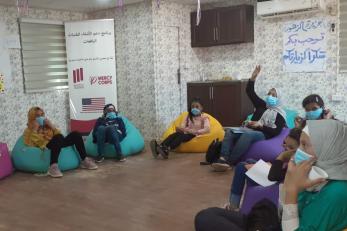ISHRAK/SSAGE: Building positive attitudes and behaviors in families is what we do

Jordan's refugee camps have seen an increase in the practice of early marriage, which is a serious danger to the lives and prospects of young girls. Early marriage infringes on girls’ rights, robbing them of their youth, disrupting their education, putting their health in danger, and limiting their future educational and career possibilities. In Azraq Camp, 16 percent of adolescent girls between the ages of 15 and 17 are not in school because they are engaged or married according to a 2017 UNICEF report.
To address this problem and the wider problem of violence against adolescent girls and women in humanitarian settings, Mercy Corps in partnership with the Women’s Refugee Commission developed the Sibling Support for Adolescent Girls in Emergencies (SSAGE) approach. SSAGE is a gender-transformative, family-based violence prevention intervention model that engages adolescent girls, their older male siblings, and their male and female caregivers in a synchronized manner through a three-month curriculum. SSAGE was first piloted by Mercy Corps in Nigeria and was then adapted to the context of Jordan with the participation of girls and their families.
After Salwa and her daughter participated in the three-month SSAGE curriculum in Azraq Camp, she changed her attitude towards early marriage and consequently decided not to marry her young daughter in order to protect her from the harmful effects of arly marriage and enable her to realize her potential.
Salwa was one of the dedicated participants who looked forward to attending SSAGE sessions. She constantly expressed her enthusiasm for the subjects and activities of the program, particularly those that dealt with the protection of girls.
One day, during a session addressing the topic of early marriage and the harmful impact it has on girls, Salwa expressed her sadness over the negative consequences experienced by her eldest daughter, who had been married at the age of 16. Salwa noticed the negative effects of the marriage on her daughter’s psychological and physical well-being and did not want to repeat this for her younger daughter.
Salwa expressed remorse for the marriage of her eldest daughter. “I'm sorry,” she said. “It's almost as if I stole her childhood.”
In a session with other mothers of girls, Salwa pledged that she would not subject her younger daughter to the anguish of early marriage. All of the participants were deeply affected by Salwa’s promise, and they were surprised at the profound influence the sessions had on changing the negative attitudes and practices that expose girls to early marriage and other forms of violence.
The SSAGE project has helped in improving families’ relations and changing harmful gender norms and attitudes at the family level, through increasing knowledge about the harmful effects of gender inequality and violence on all family members.
The SSAGE project is part of Mercy Corps’ ISHRAK program and is funded by the Bureau of Population, Refugees, and Migration (BPRM) of the United States Government. Ishrak, Arabic for ‘Engagement’, is a family strengthening project that provides psychosocial support in order to encourage positive coping mechanisms and strengthen bonds between Syrian family members in stressful situations. ISHRAK is implemented in the Azraq and Za’atari refugee camps and provides creative ways for caregivers and children to connect, play, and build positive relationships. The different ISHRAK program components are designed to complement each other in order to realize the broader goal of increasing family resilience to extreme stress and creating an environment in which children are protected and able to thrive. By focusing holistically on all generations of the family, including elders and non-parental caregivers as well as young people, the program supports whole communities’ resilience.